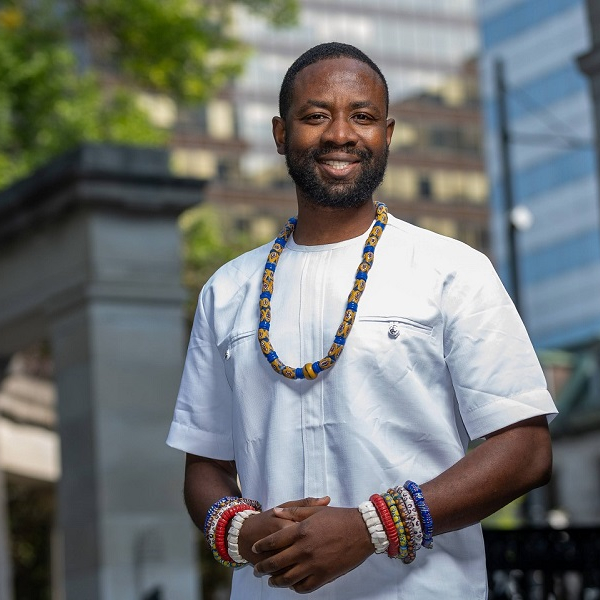Over the course of her career, McGill law professor Adelle Blackett, BCL’94, LLB’94, has gained renown, not just for discerning the missing human pieces in an academic argument or a longstanding legal principle, but for extending her intellectual activism into the broader public sphere, and challenging institutional orthodoxies that overlook those who don’t neatly fit into pre-existing labour-market models.
When she perceives inequity, Blackett, McGill’s Canada Research Chair in Transnational Labour Law, isn’t someone who quietly accepts the outdated assumptions of settled law.
As the innovative legal mind behind the development of the International Labour Organization’s ground-breaking treaty on domestic workers, she has helped reform attitudes and bring worldwide regulation to a long-neglected and undervalued global workforce of some 65 million people, mainly racialized migrant women.
“We rendered visible those who do the work of care, and the conditions under which they do it,” she said in June when accepting the Bob Hepple Award for Lifetime Achievement from the Labour Law Research Network in Warsaw, “and thought about how to transform those conditions, and in the process transform labour law.”
Her insider’s story of that treaty-making was chronicled in Everyday Transgressions, a book that won the Canadian Council on International Law’s 2020 Scholarly Book Award.
Blackett’s contributions have been recognized at home and abroad in recent years, with honorary degrees from universities in Canada (Queen’s and Simon Fraser) and Belgium (Université catholique de Louvain). In 2020, she was awarded McGill’s top teaching prize, the Principal’s Prize for Excellence in Teaching (full professor category).
“A huge undertaking”
When we get together to talk, in a wide-ranging conversation that touches on everything from the morally dubious foundation of maritime insurance law and a 1939 Supreme Court of Canada case that upheld segregation, to the precarity of airline workers in the gig economy and the revealing role of cookbooks in the history of women’s work, she is awaiting delivery of the translation of a report, due out in the fall, that she prepared for the federal Ministry of Labour as chair of Canada’s Employment Equity Act Review Task Force.
Other people’s Covid projects might have involved learning to bake a credible baguette or studying a new language. For Blackett, the bar was set much higher when Ottawa asked her in July 2021 to lead a comprehensive review of the landmark 1986 legislation and make recommendations to modernize and strengthen the terms of the Act.
“It was a huge undertaking,” she now acknowledges with the end nearly in sight. “We were a 12-person committee that met virtually during the pandemic with hundreds of constituents across the country, along with undertaking months and months of research.”
Blackett and her fellow task force members were mandated by the government to identify “systemic barriers [that] exist in the recruitment, promotion and retention of individuals in the four designated groups” – women, Indigenous people, persons with disabilities, and members of visible minorities.
Many of the people and groups Blackett heard from, quite naturally, were those who felt left out or unheard or unprotected by the 1986 ideas of equity in the workplace. And they were eager to voice the dissatisfaction that comes from not being listened to, from being ignored in the national conversation and overlooked in the labour market.
“The expression often used by the constituents who spoke to the task force,” says Blackett, “was ‘nothing about us without us.’ It’s become a fairly popular refrain among communities that have been historically underrepresented. And it tells you that the process matters, not just the result. The results are important, of course, but it’s how change is undertaken that’s key.”
“Reimagining the space”
She brings that same sensitivity to her own professional efforts for social change. She is the founding convener of the Dr. Kenneth Melville McGill Black Faculty and Staff Caucus, which seeks to, among other things, “cultivate a nurturing learning and working environment for Black faculty and staff (and, by extension, Black students)” at McGill.
She is also the principal drafter of the Scarborough Charter designed to address anti-Black racism in Canadian universities and promote Black inclusion in higher education.
She describes these efforts as “a big part of the work I’ve been able to do in the last few years in and through McGill. It’s really an attempt to ensure that universities, as they go about their own work of addressing anti-Black racism and fostering Black inclusion, are exchanging ideas with each other, and learning from each other, and also holding each other accountable. Some 60 Canadian universities and colleges have signed the Charter, including McGill – and it’s caught the attention of universities outside Canada as well.”
Blackett has long seen herself as what she calls “an insider-outsider,” beginning from her first interview for a position in labour law when she was asked to reconcile, and therefore justify, her advocacy for the rights of migrant workers with the norms of labour law – an experience, she has said, that “challenged me, every time a door was held open for me, to assume some responsibility for reimagining the space.”
For five years she chaired the Faculty of Law’s professorial recruitment committee with a commitment to enlarging the pool of eligible candidates. “Much of the work,” she says, “is making sure folks look at the pool not with a view of reproducing themselves, but opening their eyes to the contributions so many kinds of people can bring to the Faculty, and to the university space generally. It’s incumbent on us to be open to the ways in which our field can be enriched and broadened.”
She recognizes these contributions in her own classes when students draw on their varied backgrounds to challenge her claims and assumptions, an experience that brings back memories of her own experience as a questioning law student who viewed herself as an outsider.
“There’s a real richness there,” she says. “I don’t think we come into the academic world as an empty slate, but rather as communities of experience. Part of the learning process comes from making sense of what we’ve learning in relation to what we already know at a different level.”
Looking at law from a different perspective
Blackett studied history before entering McGill Law, and that training shaped her skeptical analysis of a more conservative approach to law that represents its precedents and principles as timeless and abstract truths.
“Some of the most challenging questions around precedent are the historical ones. What do you do with principles that, say, emerged out of slavery, where the object of decision-making was an enslaved person?”
Her pioneering work with domestic workers likewise drew on a realization that the entire field of employment law evolved out of traditional master-servant law, and yet somehow modern domestic workers had been written out of the labour law frameworks.
“The remembering of the source,” she says, “allows one to think a little more about the legal relationship, how it emerged and how it was framed.”
And this is where her own personal history comes into play, and in its own way, exemplifies the generative powers of academic diversity.
Her mother came to Canada from Barbados as a domestic worker before moving on to jobs as a seamstress and a unionized hospital employee. As a McGill law student, Blackett drew on her family background to become an activist with the Montreal Household Workers’ Association.
When she took an internship at the ILO in 1993, her supervisors looked at her CV and asked her if she was interested in undertaking some legal research on the regulation of domestic work in post-apartheid South Africa. “Yes, I was,” she says, “and the rest is history.”
Over a decade later, she was asked by the ILO to begin the work that led to the landmark treaty for domestic workers in 2011. Much more than a collection of well-meaning words and hopeful ideals, the ILO standard has prompted a wave of labour-law reforms and legislation around the world.
“It’s been ratified by, I believe, 39 countries,” she says, and then immediately turns on her computer to check the ILO’s running total. “It keeps changing,” she says, as the computer powers up and we await the results. “Ah, I’m a little optimistic,” she says with a laugh, “It’s 36. But they’re coming, they’re coming.”


